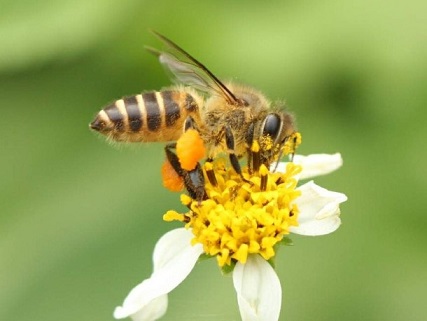
Researchers from China’s top science academy have published research
claiming that the use of imidacloprid – a widely-used neonicotinoid insecticide
– is damaging the health of Asian honey bees. The study’s findings could deal a
severe blow to China's imidacloprid industry,
according to analysts CCM.
The research, undertaken by scientists at Xishuangbanna Tropical Botanical Garden (XTBG),
Chinese Academy of Sciences (CAS), was published on June 23 and is the first
ever study of the effect of neonicotinoid insecticides on Asian honey bees (Apis cerana).
XTBG’s study found that
exposure to imidacloprid can do serious damage to Asian bees’ olfactory
learning ability, the faculty bees use to distinguish floral scents and find
nectar.
According to the study:
·
Adult bees exposed even to doses
of imidacloprid considered ‘safe’ suffered long-term learning impairments
·
Adult bees fed imidacloprid as
larvae had inferior short-term learning compared to bees that had not been
exposed to the insecticide
Apis cerana are common across South and South
East Asia and play an important role in the regions’ agriculture, so CCM
believes that the study could have far-reaching effects for Asia’s insecticides
market.
The EU restricted the use of imidacloprid and two other neonicotinoid
insecticides in December 2013 following the publication of research
demonstrating similar effects on European bees.
And Wang Jianwo, Secretary General of the Hunan Pesticide Industry
Association, has confessed to CCM that he is worried about China and other Asian
countries following the policies of the EU and implementing similar
restrictions.
Imidacloprid is a major industry in China, where over 28,000t/a of
imidacloprid TC production capacity is located, so many Chinese manufacturers
could be affected by any policy change.
Only a third of China’s output is for domestic use, meaning that a
Chinese ban would not be too devastating a blow.
However, Vietnam, Pakistan and India are major export destinations for
Chinese imidacloprid, all of which have large Apis cerana populations, so manufacturers are also vulnerable to
policy moves in other countries.
Many Chinese manufacturers are already facing financial difficulties, so
any impact on sales will be very costly. On the one hand, imidacloprid prices
have fallen significantly over the past year thanks in large part to the EU
restrictions, while producers are also facing rising costs as a result of new
waste treatment regulations.
For more information about CCM and
our coverage of China’s agrochemicals market, please visit www.cnchemicals.com or get in touch directly by emailing econtact@cnchemicals.com or calling +86-20-37616606.
-
Average:
-
Reads(3615)
-
Permalink


 Back to Cnchemicals.com
Back to Cnchemicals.com 